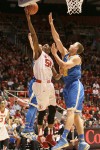American professional sports often serve as a sort of thermometer for national culture. Rarely is there a debate or trend in the political sphere that isn’t mirrored by the various professional sports leagues. Case in point: the newly resurfaced debate over the removal of the Confederate flag, which still flies over the grounds of the South Carolina statehouse.
While state legislators have voted to remove the flag, that bill faces a much steeper challenge as it heads to the South Carolina House of Representatives.
Supporters of the flag cling to it as an outdated symbol of so-called regional pride, more accurately viewed as an ancient relic from a chapter of American history that the rest of the country would prefer not to glorify.
While the Confederate flag is a single symbol that seems to be dragging our nation backwards — as evidenced by the Charleston shooting last month – over 2,000 American teams proudly display mascots that threaten to do the same.
The Washington Redskins have come under fire recently after owner Daniel Snyder swore in May to never change the team’s name. Outcry ensued, punctuated by President Barack Obama suggesting the team choose a different name and a federal judge ordering the cancellation of the team’s trademark attempt on Wednesday.
The Redskins have long found themselves in the center of the debate over political correctness in the realm of sports, as the Native American community mobilized to call for change. Last November, in what was reported to be the largest-ever protest against the football team, hundreds of Native Americans formed a picket line outside the University of Minnesota’s TCF Bank Stadium, protesting the Vikings-Redskins game.
Movements such as this serve as evidence that the use of a derogatory racial epithet as the moniker for a national team is indelibly insulting to the people this action most directly effects.
Sports have an indisputable impact on our country, but more importantly, on the millions of boys and girls who grow up idolizing athletes and sports teams. If an elementary schooler truly believes that Native American blood was used to paint the Redskins’ stadium in our nation’s capital, as Nate Silver reports, that child will grow up fully intoxicated by the endemic racism that permeates our society.
Some national sports organizations are aware of their responsibility to this effect. In 2001, the NCAA banned South Carolina from hosting postseason tournaments – a gig that can bring in multi-million dollar figures – due to the Confederate flag’s prominent presence in its capital. That same national organization, however, hosts teams with names such as the Seminoles, Utes and Chippewas – with the Utes calling the Pac-12 home.
Even my own beloved team, representative of the liberal Bay Area and most recent NBA champion – the Golden State Warriors – falls into this category of intolerance. While the World Champs’ logo features the Bay Bridge, it used to be a Native American headdress. What’s worse is that I didn’t even realize the racist undertones of the name I have so often cheered until I began researching this column.
While the calls of those who want to label our nation “post-racial” have been drowned out by ever more episodes of toxic race relations in the United States, it becomes increasingly clear that whatever could conceivably considered “post-racial” is oftentimes only dangerously naïve.
If we continue to allow sports teams to conduct themselves in a manner similar to Washington, which means scores of children run around the nation’s capital with the image of a Native American chief across their chests, we are no closer to achieving a “post-racial” status than the leaders of this so-called great nation who first raised a Confederate flag.
